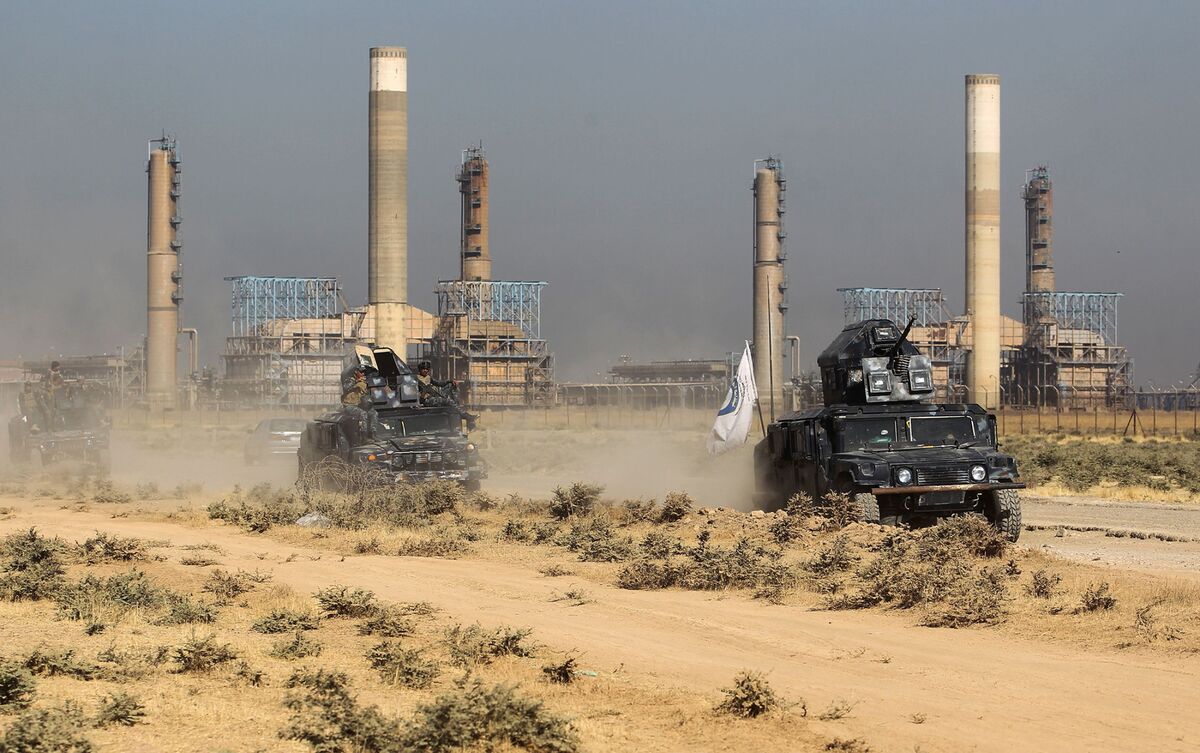
Iraqi forces drive past an oil production plant as they head towards the city of Kirkuk on Oct.
Oil extended gains as signs of declining U. stockpiles pointed to healthy demand while investors weighed potential disruptions to supply because of global geopolitical tensions.
Futures in New York rose as much as 0.5 percent after adding 2.5 percent in the past three sessions. An industry report showed U. inventories fell last week, with government data Wednesday forecast to show a fourth straight drop. Crude’s recent gains have been driven by fighting between the Iraqi government and Kurdish forces in the oil-rich Kirkuk region. The conflict’s ongoing and could stoke tensions outside the country’s borders.
The violence in Iraq is one of the geopolitical risks that the oil market is grappling with, and uncertainty is swirling over the impact of tensions between Iran and the U. as well, Goldman Sachs Group Inc. The Persian Gulf nation said it would support an extension of OPEC output cuts to the end of 2018 and insisted its production plans won’t be disrupted by U. President Donald Trump’s threats to ditch a nuclear deal that’s boosted its exports.
“Fundamentals are quite strong at the moment, with robust demand that’s draining crude inventories and geopolitical risks adding a short-term impact on prices,” said Min Byungkyu, a global market strategist at Yuanta Securities Co. “There’s a general expectation that OPEC will extend the output curbs, but deeper cuts will be needed to more effectively drive up prices.”
West Texas Intermediate crude for November delivery rose as much as 28 cents to $52.16 a barrel on the New York Mercantile Exchange and was trading at $52.04 as of 7:45 a. Total volume traded was about 29 percent below the 100-day average. Prices on Tuesday added 1 cent to close at $51.88, the highest since Sept.
Brent for December settlement rose as much as 43 cents, or 0.31 a barrel on the London-based ICE Futures Europe exchange. The global benchmark crude traded at a premium of $5.90 to WTI for December. inventories fell by 7.13 million barrels last week, the American Petroleum Institute was said to report. Data from the Energy Information Administration Wednesday is forecast to show a 3.
While Iraq’s government is clashing with Kurdish forces in the north of the OPEC nation, raising the prospect of output disruptions in the region, both sides have an incentive to keep oil flowing due to low production costs and “high revenue” available per barrel, according to Goldman.
The Iraqi government offensive was triggered by a non-binding Kurdish referendum on independence that was approved overwhelmingly in September and made more politically charged by the regional government’s decision to include Kirkuk, even though it lies outside the semi-autonomous Kurdish region. The area is home to the country’s oldest oil field.
While Trump’s administration has hardened its stance against Iran, there’s still “high uncertainty” over whether the U. will reimpose sanctions that could potentially curb the Middle East country’s crude supply, Goldman said in a report on Tuesday.
Iran’s energy industry has recovered following the removal of sanctions early last year after an international agreement over its nuclear program. Trump refused to certify that the Middle East nation is in compliance with the deal, though didn’t repudiate the pact. president’s statement was characterized by “chest-beating” and has “little or no effect” on the Islamic Republic’s oil plans, Amir Zamaninia, deputy minister for trade and international affairs at Iran’s Oil Ministry, said Tuesday.


0 comments:
Post a Comment